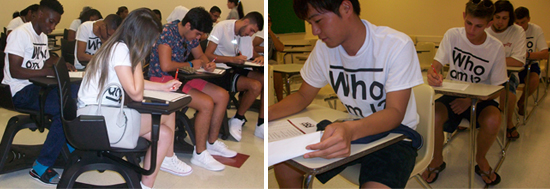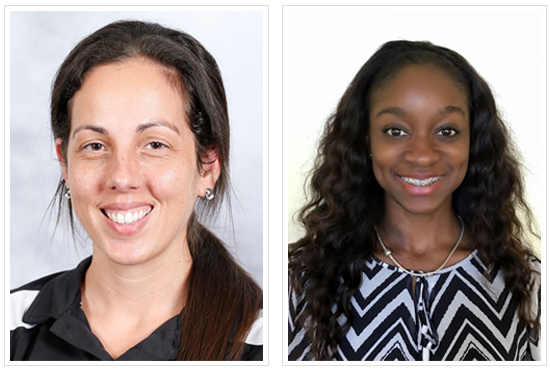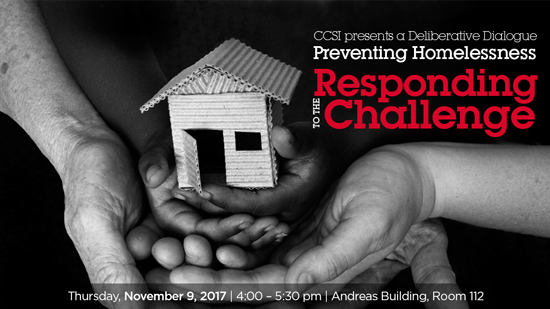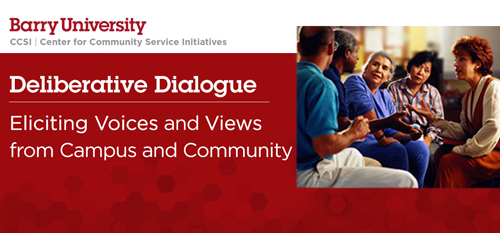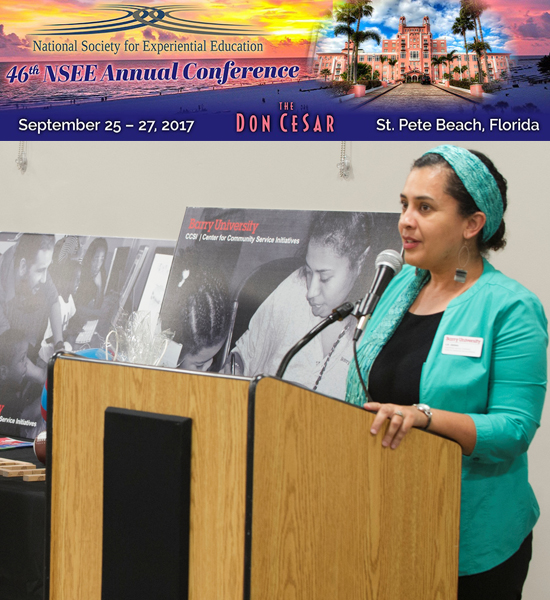|
|
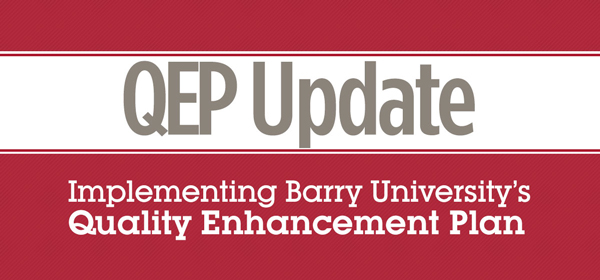
|
Survey Gauges New Students’ Attitudes to Personal and Social Responsibility
Students completing the two-part survey designed using the Personal Responsibility Scale and Social Justice Scale. Nearly 300 new undergraduates recently participated in a survey designed to gauge their attitudes and behaviors in the context of the personal and social responsibility goals of Barry University’s Quality Enhancement Plan (QEP). In all, 293 students completed a 10-item questionnaire – Personal Responsibility Scale – regarding their own behavior in everyday-life situations. A total of 291 respondents completed a 24-item questionnaire – Social Justice Scale – about their attitudes and behavioral intentions concerning social responsibility. As the 2017–2018 academic year got underway, the QEP Implementation Committee, with support from the Division of Mission and Student Engagement, had invited incoming undergraduates to complete the two-part survey. Designed as a quasi-experiment (pretest-posttest), the survey will be administered again to the same students before they graduate from Barry. QEP staff and Implementation Committee members administered the survey during New Student Orientation. |
Symposium Poster Session to Highlight Social Responsibility Outcomes of QEP
The poster session of the 2018 Community Engagement Symposium will showcase the social responsibility outcomes of Barry’s QEP. Posters will highlight outcomes of both course-based and co-curricular programs. Scheduled for March 28, the Fifth Annual Community Engagement Symposium is being organized around the theme, “Demonstrating Social Responsibility through Experiential Learning.” Barry’s QEP is titled “Fostering Personal and Social Responsibility through Experiential Learning.” Key elements of social responsibility are identified as follows: “Becoming aware of the importance of contributing to the greater good; gaining civic knowledge and skills; and taking action with others to address issues affecting local, national, and/or global communities.” Experiential learning includes service-learning, community-based research, fieldwork, clinical rotations, study abroad, capstones, and internships. The social responsibility outcomes are linked primarily to the “community engagement and collaboration” category of the QEP. The two-hour poster session of the symposium is slated for Room 112 of the Andreas Building, starting at 1:45 p.m. Poster session proposals may be submitted for review at any time between now and January 26. Poster guidelines are available from the symposium webpage. For additional information on the poster session, contact the coordinator at qep@barry.edu. |
Members of 2017–18 Symposium Committee Named
Dr. Lauren Tashman is chair of the Proposal Review Committee; Daniqua Williams is the poster Session coordinator. The Center for Community Service Initiatives (CCSI), in consultation with the Office of the Provost and the QEP Implementation Committee, has named faculty and staff members as well as students to the Community Engagement Symposium Committee for 2017–2018. Dr. Lauren Tashman, an assistant professor of sport, exercise, and performance psychology in the College of Nursing and Health Sciences, will serve as the proposal review chair. She is a member of the QEP Implementation Committee. Daniqua Williams, the QEP project assistant, will serve as the poster session coordinator. The Center for Community Service Initiatives (CCSI) coordinates the event with support from the QEP Implementation Committee. Dr. Glenn Bowen, executive director of the CCSI and director of the QEP, will continue to serve as chair of the committee. Other members of the Community Engagement Symposium Committee include Courtney Berrien, Marie Colom, Amy Deutch, Liz James, Dr. Sheila McMahon, and Felix Vega Pagan. |
Community Advisory Committee Holds First MeetingBarry University’s Community Advisory Committee held its first meeting on August 30. Provost Dr. John Murray attended the meeting and spoke briefly during lunch. In his new role as associate vice provost for student success and undergraduate studies, Dr. Victor Romano gave a formal welcome to committee members. For her part, Dr. Karen Callaghan, chair of the QEP Implementation Committee, provided an overview of the QEP as well as an update of plan implementation. Experiential Learning Coordinator Liz Jamesmade a brief presentation on “Experiential Learning at Barry,” and Courtney Berrien, associate director of the Center for Community Service Initiatives, made a presentation on “University–Community Partnerships.” Most members of the QEP Implementation Committee joined the Community Advisory Committee members for lunch. |
Deliberative Dialogue Series Begins November 9
This academic year’s Deliberative Dialogue Series will begin on November 9 with a forum focused on homelessness prevention. The series was originally scheduled to start on September 26 with a forum on Florida’s opioid epidemic. However, that forum was cancelled in the wake of Hurricane Irma. The first forum is titled “Preventing Homelessness: Responding to the Challenge.” The 90-minute forum will be held in Room 112 of the Andreas Building, beginning at 4 p.m. According to the Miami-Dade County Homeless Trust, more than 1,000 people are living on the street and some 2,800 homeless people sleep in shelters. “Homelessness is a public health concern that affects every community in the United States, and the consequences of homeless are many,” says Courtney Berrien, associate director of the Center for Community Service Initiatives. “People who experience homelessness have difficulty navigating social structures and are vulnerable to exploitation, health problems, and marginalization.” Berrien, who coordinates the Deliberative Dialogue Series, notes that the reasons for homelessness among individuals and families are diverse and complicated. The Deliberative Dialogue forum will engage students, alumni, faculty and staff members, and community partners in exploring the effects of such factors as lack of affordable housing, unemployment, mental health diseases, substance abuse, traumatic experiences, and health crises. The participants will examine methods of preventing homelessness and will propose specific responses to this challenge. Deliberative Dialogue is one of eight co-curricular events that the QEP Implementation Committee has designated as “PSR.” It is a series of facilitated forums eliciting “voices and views from campus and community.” Students, alumni, faculty, staff, and community partners take part in the forums, working toward a shared understanding of specific social issues and practical solutions to those issues. Co-curricular programs, projects, and events that carry the “PSR” are geared to achieve at least one of the six personal and social responsibility outcomes of the QEP. The outcomes are categorized as (1) Ethical and Moral Reasoning, (2) Engaging Diverse Perspectives, and (3) Community Engagement and Collaboration. Each category contains two specific student learning outcomes. Deliberative Dialogue forums fulfill three student learning outcomes — two in the “Engaging Diverse Perspective” category and the third in “Community Engagement and Collaboration.”
|
Resources Available at QEP Website
Available resources include books on experiential learning, including service-learning and community-based research. The QEP website has a variety of resources to support the implementation of Barry’s Quality Enhancement Plan. They include scholarly articles, books, fact sheets, and other publications on experiential learning, civic engagement, social responsibility, and similar topics. Some of the literature may be downloaded from the QEP website; more are available through the Community Engagement Management System (CEMS), managed by the Center for Community Service Initiatives A video that illustrates key concepts of the QEP is also available at the website. The key concepts are responsibility, community, social justice, civic engagement, service, and diversity. Barry’s QEP is focused on personal and social responsibility through experiential learning. For further information on the QEP and to access experiential learning resources, contact the QEP office at qep@barry.edu or the CCSI at service@barry.edu. |
QEP Staff Member Leads Session at Conference
Experiential Learning Coordinator Lizbeth James (above in a file photo) was a presenter at the annual conference of the National Society for Experiential Education. A Barry QEP staff member was a presenter at the 46th Annual Conference of the National Society for Experiential Education (NSEE) on September 26. Lizbeth James, experiential learning coordinator, facilitated a 60-minute session titled “Safe Space Theater: An Experiential Approach to Orientation and Training.” The three-day conference – with the theme, “From Principles to Practice: Experiential Education Innovation in a Changing World” – was held at Loews Don CeSar in St. Pete Beach, Fla., September 25–27. NSEE is a nonprofit membership organization composed of educators, businesses, and community leaders. Founded in 1971, NSEE also serves as a national resource center for the development and improvement of experiential education programs nationwide. |
|
If you wish to unsubscribe or update your email subscription, please visit our email preference center. ©2017 Barry University. All Rights Reserved. |

